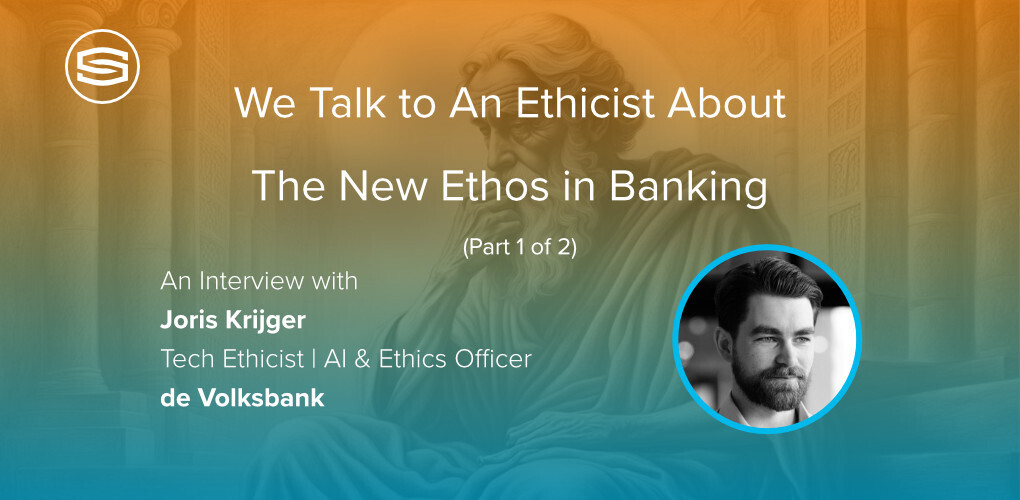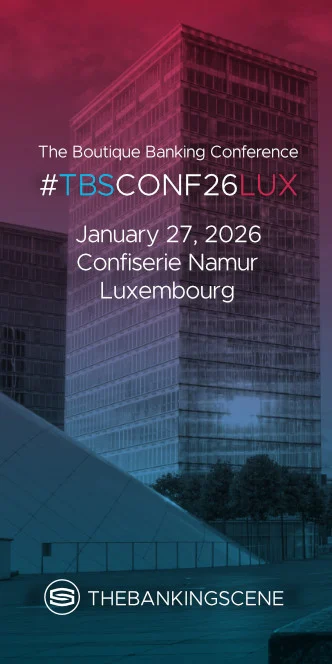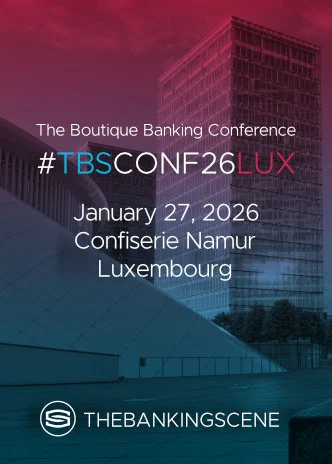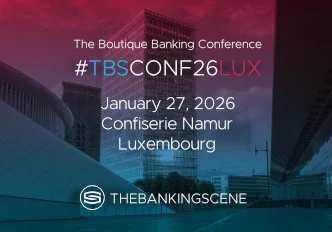
Insights & Opinions
We Talk to Ethicist Joris Krijger About The New Ethos in Banking (Part 1 of 2)
Mon, 29 Jan 2024


Who better to speak to when writing a book about Ethos and Ethics than an Ethicist? Joris Krijger, Tech Ethicist, AI & Ethics Officer, de Volksbank is a long time friend of The Banking Scene, having joined us at our events in the past to share his thoughts and guidance on AI & Ethics. So, I was eager to hear what he thought about The New Ethos in Banking. We ended up having such a long and interesting conversation that I've decided to split this into 2 posts!
Thank you for your interest to inspire me in writing my book “The New Ethos in Banking, Embracing Ethics And Values For a Meaningful Transformation”. How would you define ethos and ethos in banking?
Academically, I would place ethos in the triad of logos and pathos, as it was proposed by Aristotle. From an ethics perspective, to me it means the credibility and the legitimacy of an individual or an organisation. In my understanding, that resembles Aristotle’s notion of the sort of authority on a certain subject. Translating that to an organisation, it comes down to the credibility and the social legitimacy: your license to operate.
That relates very much to ethics and to your role within society. Because legitimacy is not something you can give to yourself, it is derived from society that provides you with the legitimacy to do the business you are doing.
Many people I interviewed refer to culture and DNA as a translation of what ethos means. It's something that is part of an organisation, but as such, it cannot be defined by the organisation. They can influence it, but they cannot determine it. You can say that we have a good culture, but if everyone is convinced that it's a toxic culture in the end, it's still a toxic culture.
The same is valid with legitimacy and credibility of an organisation. You can say we are very trustworthy and credible, and our operations are legitimate, but ultimately, it's part of an institutional framework where you have consumers who have a say in that, and also regulators, and oversight bodies, who all have a say in whether your business model is legitimate and whether your organisation is credible and trustworthy. So you can say, and you can aspire to be the most credible organisation out there, but indeed, it's not something you can determine yourself, which makes it very interesting.
In the context of my book, I'm also relating ethos to logos and pathos, as you suggested earlier. Based on the history of banking, I will try to reconstruct what went wrong in the industry on these different dimensions. My personal interpretation is that ethos got lost over the years through various scandals, going from the global financial crisis to many fraud cases. Of course, not all banks were to blame. But that's how it was often perceived.
You had logos, that relates to logic. Banking is a complex industry. Although it attracted very bright minds, a combination of factors made banks get lost in their own complexity in a way. Pathos refers to the extent to which a bank is still a mirror of society, truly capturing what people expect from a bank; it is about empathy and understanding. In the past, we had a financial advisor, he knew everyone, it was clear. Today, people need to trust the institution. And that's much more intangible. And because of digitalisation, which circled around convenience, seamlessness, etc., banks kind of lost some of their empathy. That's my interpretation.
I'm very keen to hear how you look at that as an ethicist but also from a tech point of view, given the research that you've gone back to in that respect.
I share your diagnosis of the problem. I've been in the industry now for five years, so not sure I can give an answer with any real gravitas. What I've noticed so far is that the narrative on the role of banks within society has changed substantially. That is in part due to the financial crisis but also due to the urgency of the climate change problem and rising inequality. We need to rethink how we conceptualise our measurement for success as a financial institution.
Banking in the '70s and '80s was structured around neoliberal principles, and so what it meant to be successful as a bank was to provide the best possible return for your shareholders. Over time, we have seen that this measurement for success is changing towards providing value for stakeholders. But that transition is something I think organisations are still grappling with.
So, what does it mean for us to be successful? We're still somewhat in the old mindset of providing value for shareholders, but we also want to provide, and we feel the need to provide value for our stakeholders. Balancing those two is very difficult because of the legal organisational structure, which is still designed in a traditional way where shareholder value creation is the ultimate goal.
Today, banks are confronted with ESG, with the responsibilities that they have as gatekeepers in fraud detection etc. and that changed the narrative of a bank’s role in society. Because of the new possibilities and the changing technology, new expectations arise and new ethical dilemmas. This duality between shareholders and stakeholders makes it very difficult to meet new expectations in a concerted way. How do you maximise shareholder value while aligning the business with societal expectations? How do you balance both interests?
From an ethical perspective, that's what I find really interesting in the current times. We are aware of the responsibility that we have towards stakeholders, but we still need to instil it in the way our organisation and decision process are designed.
How do you think that will evolve?
It could go two ways. Either, we stick to the traditional model we are comfortable with. And I mean, that can be a ground for legitimacy as well, where we hold on to the old narrative and try to sell it as well as we can. That’s where greenwashing and ethics washing come into play, where we try to present to do better but don’t act on it.
In that case, are we still building a new ethos? Will we keep having an ethos at all?
Likely not, and the question is also whether it's sustainable. Even if we say we will focus only on the responsibility we have towards our shareholders, then the question I always ask is ‘shareholder value on what horizon?’. We normally conceive of the focus on the interests of shareholders as meaning this year profits or the next quarter, this is the traditional model. But if you say we value the interests of shareholders for the next 10 to 15 years, then all of a sudden, your horizon changes, and you have to make more sustainable decisions. You must take into account societal interest and the legitimacy you are granted by the society you operate in because otherwise, you cannot even create value for your shareholders, even if that's your sole purpose. So I think we need to review our model because it's an unsustainable way of working, doing one thing and saying the other. This is the second way banking could evolve.
It adds more complexity to banking again, because suddenly, you need to start envisioning a future in 15 years, at a time when things have never evolved faster.
With that change of horizon, all of a sudden, you find yourself asking new questions like: can we implement this policy? It may create more profits the next year, but what will happen in the long term? That is a long-term perspective that is really valuable in this transition towards a more socially responsible form of banking.
To what extent do you believe that, for example, banking creates inequality by the construct of what banking is about? Banks are risk managers, meaning that people who are less well off often pay a higher risk premium or don't have access to banking products at all.
It's a question I've been thinking about for quite a long time. I once heard this bit by a comedian Louis C.K., in his very early days: "Well, what's the idea of banking? When you're broke, the bank starts charging you money... for not having enough money. If you have a lot of money, they give you money. Because you have a lot of money! You have so much money that we should give you some! Because you have a lot you should take more.".
That seems very unethical from the beginning. And I think if you look at it from that perspective, it seems to supercharge inequality in a way. But what it really touches on is the question of what the responsibility of a bank is because, as you pointed out, they are risk-managing institutions. In the long term it makes no sense for a bank to grant loans for the people who are less well off if these people cannot repay. Basically, in the financial crisis of 2008, you saw a very poor form of risk management, where everyone was given all sorts of dubious products to buy houses or cars they couldn't actually afford. Once the music stopped, the whole house of cards collapsed.
So in my opinion, as a bank, we do play a role in the rising inequality. But I don’t think that has to be the case. What I’m particularly interested in is, can private interests serve the public good? I think it can, and we’ve seen examples where private interests actually further the common good more than public institutions might have been able to. But we’ve perhaps seen many more examples where these interests clearly conflict and this market logic prevails. With their narrow measure for success I think banks, like many other institutions, started to play a role in the extraction of value from society rather than in adding value to it. Very much like Louis CK indicated with his simple observation.
Our operating logic sometimes hinders us in thinking about what might be productive use of the power and resources we have and it is very hard to go against that but I think to be part of the solution and not the problem we’ll have to.
At The Banking Scene Art Night, Ghela Boskovich spoke about the fact that we need more effectiveness in our digital process instead of efficiency. She gave the example of selling a house. A bank looks at it as selling a loan. From a consumer point of view, as a bank, you also realise dreams; you give consumers a place to come home, a place for family, a place to relax, to be comfortable. From a government point of view, home ownership will lead to a better community. People will take more care of their house compared to renting; people are more responsible and involved, and the mortgage indirectly improves the environment overall and increases quality and value. So, in that respect, you are fulfilling many more roles than what we often think happens with mortgages.
I agree and again, this touches on the social responsibility of a bank. A quick philosophy lesson: in his essay on justice as fairness the philosopher, John Rawls, had the basic rule that any new policy, I'm very much simplifying this, but any new policy is accepted if it helps the least well-off in the best possible way. Inequality is permitted if it is in the advantage of the least well-off. That is a productive way to think about these issues.
It would be great if, in addition to the thorough management we have around the distribution of risks, we would start to consider our role in the distribution of opportunities. As you point out, that means looking at our role in improving communities and people’s lives- more generally.
Read the conclusion of the interview in part 2 here.
You can hear more from Joris and meet him in person at The Banking Scene Conference 2024 Brussels.



